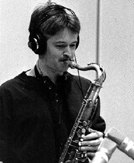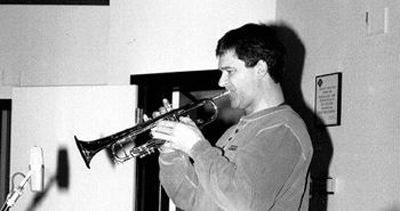
Vol. 1 no. 5
"What it was about was the idea that you could build a band from the rhythm section..."
AW: When did Time Warp start?
BE: Well, it actually started in the late seventies; it was just a trio with Al Henderson, myself and Bob Brough. I finished York and had studied with Jim Blackley, but I couldn't buy a jazz gig because there were so many good drummers here. I was here almost ten years before I really got a good jazz gig. Within that period I had gotten married, had a kid, and so I had to make some bread. I was working those gigs that don't exist any more; six nights a week lounge lizard dinner and dancing music in places like Inn on the Park, the Waldorf Hotel, the Skyline Hotel and Constellation Hotel. Bobby, Al, and I decided to form a jazz trio; the real predecessor to Time Warp was a trio with Jane Fair, but she bowed out at some point, and Bobby was in the same dance band. We all wanted to have a chance to play our own compositions, to keep writing more.
AW: When did you start writing tunes?
BE: Probably when I started going to York. I don't remember who told me, but it was made clear to me that as a drummer it would help my playing to continue trying to write music. So I started, usually with a blues or something, short melodic things, which I still prefer doing. Some of them were just god-awful, just so dumb, but others were pretty good.
AW: So when did you meet Mike
Murley and Kevin Turcotte?
BE: Murley I met first, because he was at York briefly. I remember that Al kind of hipped me to this new saxophone player, and it was clear that he was going to be a player. He was looking for information, and he was either going to get it at York or New York, or out of a book. I thought, I gotta get with this guy. I know I did a gig with him and we asked him to join Time Warp almost immediately. The first gig we did was at the Bamboo Club, around 1984 or something like that. Somewhere around there, possibly later, we were having a session, and he brought over this bass player named Jim Vivian, who wasn't yet living in town, fresh from the National Youth Orchestra. These guys were great; Mike took Vivian and me back to Halifax to play Peppe's. That's where I met bassist and bon vivant Skip Beckwith. But that's another story. Suffice to say I hung out with Skip one night and I lived to tell about it.
 Turcotte came along later, because Bobby was going
to leave the band. Bobby has such a huge sound on the tenor that we couldn't
think of anyone that could replace him on the saxophone. It had nothing
to do with what he played; it had to do with this guy who played from his
guts with a big fat tenor sound. Next to him was Murley, who has great technique
and a great depth of emotion; they complimented each other perfectly. When
it was time for Bobby to go, I thought, "We can't replace that."
We had a little gig somewhere on Yonge Street, probably
part of the Jazz Festival, and Kevin Turcotte was hired. Somebody had told
me that he played well, so we hired him. At the end of the night, I hired
him for this one gig. During the last break I told Al Henderson that we
should hire this guy permanently. Al agreed. At the end of the night, I
told Kevin we wanted him to join the band. He thought I was joking, so he
never called me back. He said, "Yeah, right!" Eventually we got
it straight.
Turcotte came along later, because Bobby was going
to leave the band. Bobby has such a huge sound on the tenor that we couldn't
think of anyone that could replace him on the saxophone. It had nothing
to do with what he played; it had to do with this guy who played from his
guts with a big fat tenor sound. Next to him was Murley, who has great technique
and a great depth of emotion; they complimented each other perfectly. When
it was time for Bobby to go, I thought, "We can't replace that."
We had a little gig somewhere on Yonge Street, probably
part of the Jazz Festival, and Kevin Turcotte was hired. Somebody had told
me that he played well, so we hired him. At the end of the night, I hired
him for this one gig. During the last break I told Al Henderson that we
should hire this guy permanently. Al agreed. At the end of the night, I
told Kevin we wanted him to join the band. He thought I was joking, so he
never called me back. He said, "Yeah, right!" Eventually we got
it straight.
BE: The band was started by Al and I, and it was a very organized kind of thing. Al and I shared an apartment while we were still going to York. We were living and breathing records every day, analyzing them; it was a great time for learning. We'd go out and hear music and then come back and play a session late at night. We'd get inspired downtown and come back and step all over it ourselves. When it came time to put this band together, which wasn't yet called Time Warp, it was pretty clear what it was about.
What it was about was the idea that you could build a band from the rhythm section, the role model being the Mingus band. We were very influenced by Charles Mingus and Dannie Richmond, the way those guys played together for so many years, and going to hear them play, hearing and watching how they worked together; it was like one thing. That was a big lesson, this idea that it's not a good bass player or a good drummer, it's a good rhythm section. We were singlehandedly trying to reinvent the wheel; we were trying to offer a rhythm section unit kind of thing. The tradition has always had great rhythm sections: Elvin Jones with Jimmy Garrison or Wilbur Ware, Philly Joe Jones with Paul Chambers, Connie Kay with Percy Heath, Vernell Fournier with Israel Crosby, Ed Thigpen with Ray Brown, and so on. We were also doing a lot of writing, and it was a workshop kind of thing; we'd all bring in our tunes and work through them.
The other element that we liked was not having a comping instrument. That was by design; I learned all kinds of things doing that, because you're so exposed on the drums. How do you tune them, you can't be banging on a tom-tom that's tuned to a B when you're playing a song in Bb.